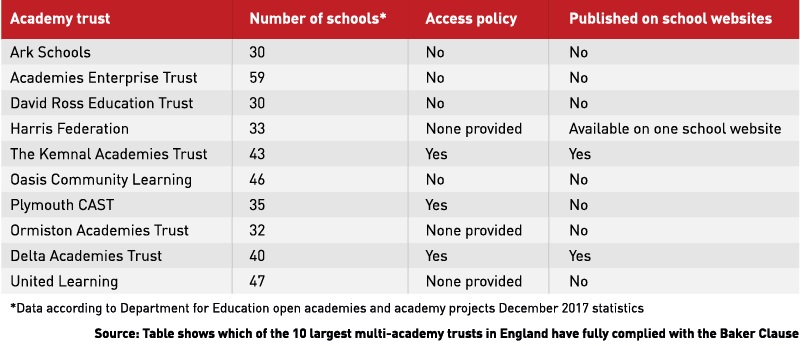Just two of the 10 largest multi-academy trusts in England have fully complied with their new legal duty to allow training providers and colleges the chance to speak to pupils about technical qualifications and apprenticeships.
The Baker Clause, an amendment to the Technical and Further Education Act, came into force on January 2, and requires all schools to publish a policy statement on their websites.
An FE Week investigation has found that most large trusts have however failed to meet that duty.
In fact, of the 10 trusts investigated, only The Kemnal Academies Trust (TKAT) and Delta Academies Trust responded with a copy of their statements and proof they had published them on their schools’ websites.
Plymouth CAST had a document ready, but admitted it was only available from its trust homepage; the others were either in the process of formulating the documents or declined to respond to our requests.

Lord Baker, the former education secretary who forced the new law through, has written to the government demanding action.
Under the rules, every school is obliged to give training providers access to every pupil between years 8 and 13, so they can find out about non-academic routes.
According to the Department for Education’s statutory guidance, schools needed to have published “a policy statement setting out their arrangements for provider access”, which “should be made available on the school website”.
This must explain how to arrange access, which premises or facilities can be used, and the grounds for granting or refusing requests.
When Lord Baker prosed the changes in February last year he acknowledged the move was likely to be “met with great hostility in every school in the country”.
Nevertheless, he told FE Week this had been a “very, very poor start”.
“I am going to write to [academies minister] Lord Agnew about it. It’s really a matter for the government to chase them up,” he said, though he admitted he was “not surprised”.
“We know that many schools will try to resist this, but it’s very important that it should be implemented more rigorously.”
Robert Halfon, a former skills minister who now chairs the parliamentary education committee, has also pledged to write to Agnew, and said trusts “must get their act together”.
“Parliament has legislated for this requirement for a very good reason – it’s vital that more is done to promote technical education,” he said.
“I shall be writing to the minister to establish what efforts the Department for Education has made to ensure academies publish these policy statements, and what actions it intends to undertake to ensure academies up their game and comply with the law.”
A DfE spokesperson said “We brought in these reforms to make sure that all pupils are aware of the range of routes into the workplace so that they can make confident, informed decisions.
“We published statutory guidance for schools on 2 January, to coincide with this new duty coming into force, which made clear that schools have to provide opportunities for technical education and apprenticeship providers to talk to pupils, and to publish a statement of their plans on their website.
“We recognise this is a major change for schools, which is why we have allowed them time to prepare and ensure they can introduce it successfully.
“We will continue to work with schools, academy chains and representative groups, to make sure pupils are getting the advice they need, and schools are doing what they are obliged to do.”








Your thoughts